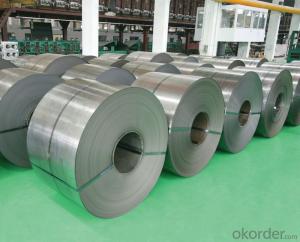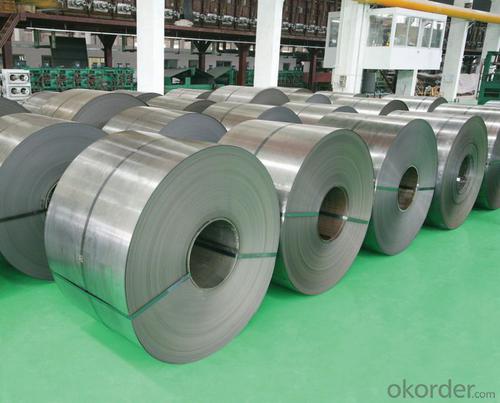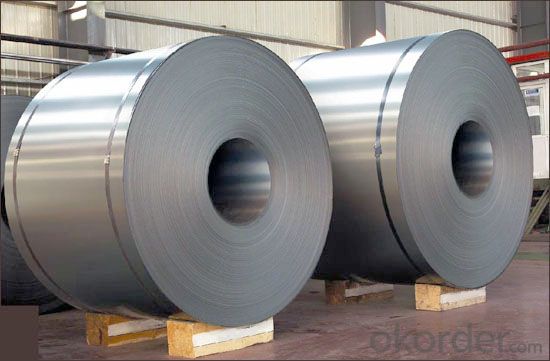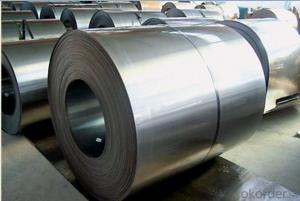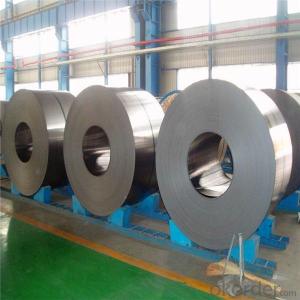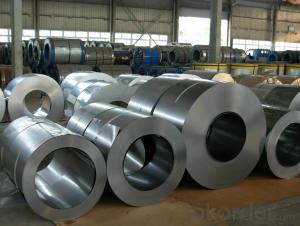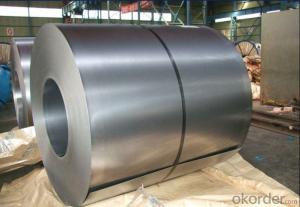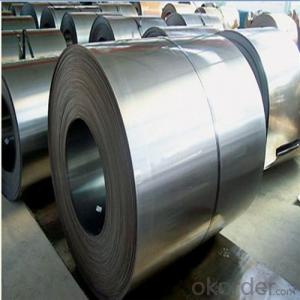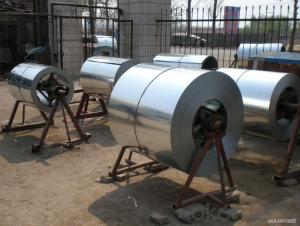Cold Rolled Steel Coil Used for Industry with So Kind Price
- Loading Port:
- Tianjin
- Payment Terms:
- TT OR LC
- Min Order Qty:
- 25 m.t.
- Supply Capability:
- 1000 m.t./month
OKorder Service Pledge
OKorder Financial Service
You Might Also Like
Pure Cold Rolled Steel Coil Used for Industry
1.Structure of Cold Rolled Steel Coil Description
The thin gauge cold rolled steel sheet and strip steel have advantages of low surface roughness, high dimension accuracy and good mechanical properties etc, and which have been widely used in auto manufacturing, home appliance, architecture, aviation, precision instrument, hardware and enameling industry etc.
2.Main Features of the Cold Rolled Steel Coil
•High Purity
•Easy control and operation
•High strength
•Fast melting
•Competitive price
•Best Service
3. Cold Rolled Steel Coil Images
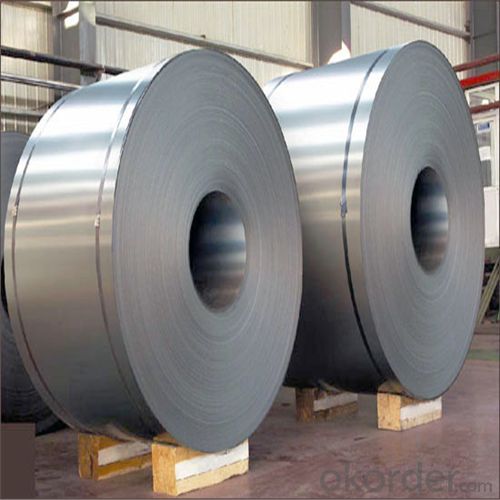
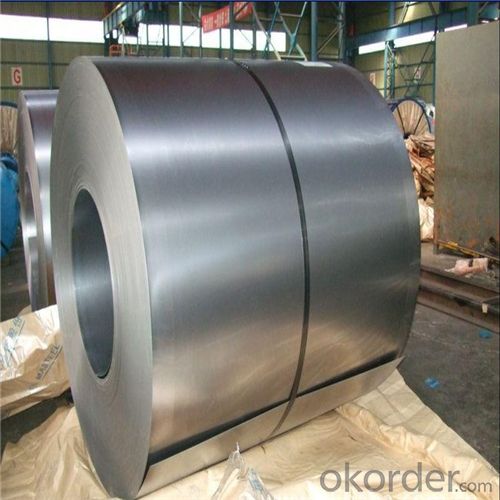
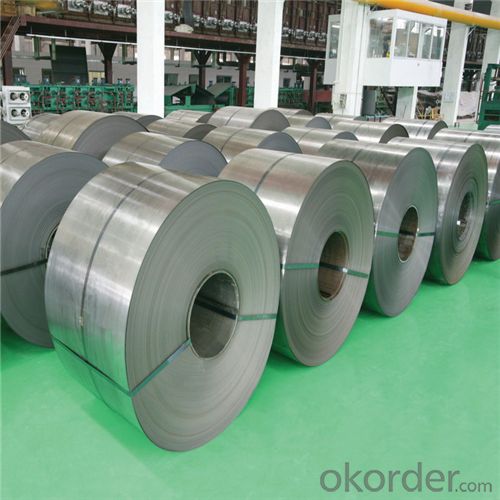
4. Cold Rolled Steel Coil Specification
COLD ROLLED STEEL COIL | |
Thicknenss | 0.10mm-4.00mm |
Width | 600mm-2000mm |
Sheets length | 1200-6000mm |
Coil inner diameter | 508-610mm |
Surface treatement | matt finish/bright finish,oiling/dry, bright anneal/black anneal |
Coil weight | 3-5t |
5.FAQ of Cold Rolled Steel Coil
We have organized several common questions for our clients,may help you sincerely:
①How about your company?
A world class manufacturer & supplier of castings forging in carbon steel and alloy steel,is one of the large-scale professional investment casting production bases in China,consisting of both casting foundry forging and machining factory.
②How to guarantee the quality of the products?
We resolutely put an end to unqualified products flowing into the market. At the same time, we will provide necessary follow-up service assurance.
③How long can we receive the product after purchase?
In the purchase of product within three working days, We will arrange the factory delivery as soon as possible. The pecific time of receiving is related to the state and position of customers.Commonly 7 to 10 working days can be served.
- Q: I bought a steel pendant on eBay, but it turned out to be too shiny.I've read on a couple forums that if I leave it soaked in urine for 2 days, it will get duller.Now, if it really does get duller, will the pendant get rusty afterwards?So is the shiny surface the only thing that prevents it from rusting?Any simple, non-urine ideas on how to make it duller are welcome too.Thanks!
- Stainless steel will rust under proper conditions. I live on a boat on salt water, trust me. If the urine works it won't be prone to rusting any more than before. It's not the shine that inhibits rusting with stainless steel, it the % of carbon in the steel, compared to regular steel. IF the urine works it's because it is acidic (a mild acid). Wash it with a small brush and some baking soda to neutralize the acid when your done. A much stronger acid would be swimming pool acid. (Muriatic acid) but be careful you might test a spot with a Q tip on the back. If you try Muriatic acid it would take seconds.Then wash in baking soda water to remove all acid.. SS
- Q: I have been searching on pots and pans, how can I find out if it's really stainless steel, someone told me if a magnet sticks to it it's real stainless steel is this true?
- Some types of stainless are magnetic and some are not. being magnetic isn't a reliable way to tell the difference. In fact, only the cheapest pots would be made out of grades of stainless that are magnetic. Stainless pots/pans are generally made of non-magnetic types, but then again, aluminum isn't magnetic either. Aluminum and stainless are superficially very similar.
- Q: What are the different methods of shearing steel coils?
- There exist various approaches to shearing steel coils, each with its own unique pros and cons. Some of the most prevalent methods include: 1. Guillotine Shearing: This technique involves the use of a guillotine-like machine that vertically moves a blade to slice through the steel coil. Guillotine shearing provides high efficiency and accuracy, making it suitable for large-scale industrial production. However, it can lead to deformation or burrs on the cut edges. 2. Rotary Shearing: In rotary shearing, a set of rotating blades is employed to cut through the steel coil. This method enables continuous cutting, making it ideal for high-speed production lines. It ensures a clean and precise cut, but necessitates regular maintenance and blade sharpening. 3. Slitting: Slitting entails passing the steel coil through circular blades that create multiple parallel cuts. This method is commonly used to produce narrower strips from wider coils. It offers great precision and the ability to generate multiple strips simultaneously. However, slitting may result in edge burrs or camber on the strips. 4. Laser Cutting: Laser cutting utilizes a high-powered laser beam to melt or vaporize the steel coil along a predetermined path. This method offers exceptional precision and can cut intricate shapes or patterns. It is commonly employed for specialized applications where accuracy is crucial, although it can be relatively costly. 5. Waterjet Cutting: Waterjet cutting employs a high-pressure stream of water mixed with abrasive particles to cut through the steel coil. This method is versatile and can handle various materials and thicknesses. It is especially useful for cutting heat-sensitive materials or for applications requiring minimal distortion. 6. Plasma Cutting: Plasma cutting involves ionizing a gas to create a plasma arc that melts and blows away the steel coil. This method is fast and efficient, making it suitable for cutting thick steel coils. However, it may produce a wider heat-affected zone compared to other methods. 7. Electrical Discharge Machining (EDM): EDM employs electrical discharges to erode the steel coil and achieve the desired shape. This method is commonly used for intricate or delicate cutting tasks that demand high precision. It is particularly effective for hard materials. Each method of shearing steel coils possesses its own set of advantages and limitations, and the choice depends on factors such as the required precision, speed, material thickness, and the desired end-product.
- Q: Are steel coils used in electrical equipment manufacturing?
- Yes, steel coils are commonly used in electrical equipment manufacturing. They are often used in the construction of transformers, motors, generators, and other electrical devices. The steel coils provide structural support, magnetic properties, and efficient conduction of electricity, making them an essential component in electrical equipment manufacturing.
- Q: steel bollard poles?
- They're short steel posts that are used as a barrier to keep traffic out of an area. If you want to see an example Google it and look at the pics.
- Q: What are the dimensions of steel coils used in the power generation industry?
- The specific application and requirements determine the varying dimensions of steel coils used in the power generation industry. Generally, there is a wide range of sizes and thicknesses available for power generation steel coils. For power generation purposes, the width of steel coils can range from a few inches to several feet, depending on the intended equipment or machinery. These coils are specifically designed to fit manufacturing processes or components within power generation systems. The thickness of steel coils used in power generation can vary greatly. Thicker coils are commonly used for heavy-duty applications that require increased strength and durability. On the other hand, thinner coils may be suitable for less demanding tasks or when reducing weight is a priority. Furthermore, the weight of steel coils for power generation can vary based on their dimensions and the specific steel material used. Consideration of weight is crucial during transportation, installation, and handling of the coils. It is worth noting that manufacturers in the power generation industry can customize the dimensions of steel coils to meet specific project requirements. They work closely with power generation companies to understand their needs and offer tailored solutions that meet their dimensional specifications.
- Q: How are steel coils used in the production of signage?
- Steel coils are used in the production of signage by being cut into sheets and then shaped into various sign components. These coils provide a durable and rigid material that can be easily manipulated and formed into different shapes, allowing for the creation of sturdy and long-lasting signs.
- Q: what do you think about producebility of low density steel? for example: can density of 1020 steel (or ony others) be decreased without any loss of other properties.
- If a material has a lower density than steel, then it isn't steel.
- Q: What are the environmental impacts of producing steel coils?
- The production of steel coils has numerous environmental effects. Firstly, it entails the extraction of iron ore, which necessitates mining activities. These mining operations can result in deforestation, habitat destruction, and soil erosion. Furthermore, considerable amounts of energy are required for the extraction and processing of iron ore, contributing to greenhouse gas emissions and air pollution. Moreover, the production of steel coils involves various stages, including smelting and refining, which are energy-intensive and release significant quantities of carbon dioxide, sulfur dioxide, and nitrogen oxides. These emissions contribute to air pollution, acid rain, and climate change. Water consumption is also a noteworthy environmental impact. Steel production necessitates substantial volumes of water for cooling and processing purposes. This high demand for water can strain local water resources and potentially lead to water scarcity or pollution if not managed properly. Furthermore, the steel industry generates substantial quantities of waste and by-products, such as slag, dust, and sludge. Proper disposal and treatment of these waste materials are crucial to prevent soil and water contamination. Lastly, transportation plays a role in the environmental impact of steel coil production. The transportation of raw materials and finished products can result in carbon emissions and air pollution, particularly for long distances. To mitigate these environmental impacts, various measures can be implemented. Adopting more efficient production processes, such as recycling and utilizing renewable energy sources, can reduce energy consumption and emissions. Additionally, enhancing waste management practices, investing in water conservation technologies, and optimizing transportation logistics can help minimize the environmental footprint of steel coil production.
- Q: Hey guys do you know anything about Steel Arch Building and how this structure really looks like?
- Just google steel arch building, you will get plenty of selection , pictures, prices and designs
Send your message to us
Cold Rolled Steel Coil Used for Industry with So Kind Price
- Loading Port:
- Tianjin
- Payment Terms:
- TT OR LC
- Min Order Qty:
- 25 m.t.
- Supply Capability:
- 1000 m.t./month
OKorder Service Pledge
OKorder Financial Service
Similar products
Hot products
Hot Searches
Related keywords
